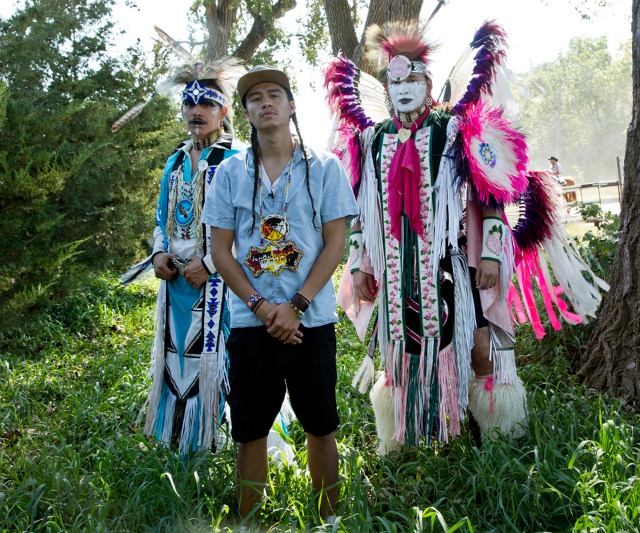Indigenous Rapper Frank Waln Is The Sound Of #NoDAPL Struggle
By Stephen Gossett in Arts & Entertainment on Nov 28, 2016 5:36PM

Frank Waln (center) / Photo: Bailey Rebecca Roberts
Even though the young rapper is based in Chicago, we’re ashamed to say it took a national tragedy to get Frank Waln on our radar. Waln is one of dozens of artists who performed over the weekend at the Mni Wiconi: Water Is Life festival in North Dakota, a benefit fundraiser for water protectors at Standing Rock.
A Sicangu Lakota native, Waln hails from the Rosebud Reservation in South Dakota, and moved to Chicago to study Audio Arts and Acoustics at Columbia College. In his music, he positions himself in the politicized hip-hop tradition of Nas and Talib Kweli, but uses that legacy to lend smart, non-didactic perspective to the underrepresented contemporary Native American experience and challenge stereotypes.
“There are a number of Native hip-hop artists who play off the kitsch of what it is to be Indian because that’s what’s going to give them notoriety,” said Alan Lechusza Aquallo, a professor of American Indian studies at Palomar College, in a recent Pacific Standard profile of Waln. “[Waln] has his long braids, but he’s wearing street clothes. He’s not playing Indian.”
Waln’s most recent release is the October single “7,” which blends a long-lens historical outlook with consideration of present-day issues, traditional Native sounds and of-the-moment trap-influenced production.
Waln spoke about the track with Fader last month for Indigenous Peoples' Day:
"This song is about not forgetting who we are and where we come from as indigenous people. Colonization attempted to, and continues to, destroy our cultures, languages, land, and everything that makes us indigenous. Our ceremonies and cultures were illegal under U.S. law from 1883-1978. In every indigenous community I visit, including my own home, I see young indigenous people speaking their language, singing their songs, and bringing back the ceremonies. I see language and cultural revitalization programs all throughout Indian Country. This is all despite the continued colonization of our homelands, communities and bodies."
As urgent as his music sounds at this moment, Waln's own non-musical dispatches are invaluable at the moment, as he visits Oceti Sakowin Camp and other key sites in the protest against the North Dakota pipeline expansion into sacred grounds—especially as the Army Corps' Dec. 5 deadline for protesters to vacate looms. You can follow him on Twitter and Instagram and find more of his music on Soundcloud and Bandcamp.